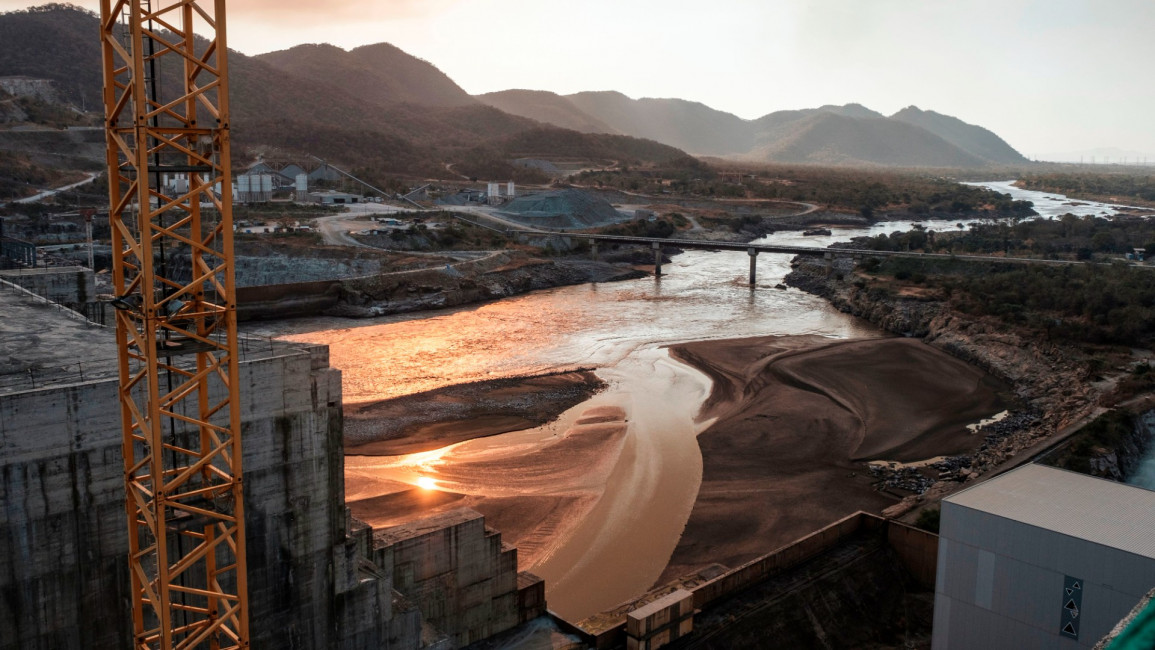Sudan says talks on Ethiopia's Nile dam fail to produce deal
The latest round of talks between three key Nile basin countries have failed to resolve a contentious dispute over construction of a giant $4.6 billion hydroelectric dam in Ethiopia, Sudan’s irrigation minister said Wednesday.
The yearslong dispute over the Grand Ethiopian Renaissance Dam on the Blue Nile pits Ethiopia’s desire to become a major power exporter and pull millions out of poverty against Egypt’s concern that the dam will curtail its critical share of the river if filled too quickly.
Sudan has long been caught between the competing interests of Egypt and Ethiopia. It stands to benefit from Ethiopia's dam, including having access to cheap electricity and reduced flooding, but it has raised fears over the operation and safety of the Ethiopian project and says it could endanger Sudan's own dams.
The three countries resumed negotiations on June 9 via video conference after months of deadlock. Officials from the US, EU and South Africa, the current chairman of the African Union, attended the talks as observers.
Sudan's Irrigation Minister Yasser Abbas told reporters in the Sudanese capital Khartoum after talks ended Wednesday that the three counties' irrigation leaders have agreed on “90% or 95%” of the technical issues but the dispute over the “legal points” in the deal remains dissolved.
Abbas said they decided to turn to their political leadership to end the standoff. No date was set for a return to talks, he said.
“A deal should be signed before the start of the filling, (of the dam)” he said. “There is no solution but negotiations.”
Ethiopia’s water and irrigation ministry said that although technical issues were resolved a key legal issue had yet to be worked out.
“Beyond ensuring the optimal operation of the GERD, the negotiation requires prudence to safeguard the permanent right of Ethiopia over the Blue Nile,” the statement said.
|
Sudan wants to ensure that water releases from the Ethiopian dam are coordinated with water levels at its Roseries dam, around 100 kilometers (62 miles) from the GERD, the Sudanese minister said.
He said Sudan and Egypt rejected Ethiopia’s attempts to include articles on water sharing and old Nile treaties in the dam deal. “This is a deal only on the operating and the filling of the dam,” he said.
Hisham Abdalla, a Sudanese negotiator, said at the news conference that they had agreed on US-brokered talks to make the deal “legally binding.
"Ethiopia, however, in this round retracted, suggesting that the deal to be a guiding one that could be modified or canceled. This is a very serious situation,” he said.
Egypt's irrigation minister, Mohammed Abdel-Atty, said in a statement that talks had achieved “little" progress and ended when Ethiopia rejected a proposal to return the prime ministers of the three countries in an attempt to solve the standoff.
Egypt has received the lion’s share of the Nile’s waters under decades-old agreements dating back to the British colonial era. Eighty-five percent of the Nile’s waters originate in Ethiopia from the Blue Nile, which is one of the Nile’s two main tributaries.
Ethiopia wants to begin filling the dam’s massive reservoir in the coming weeks. But Egypt has raised concerns that filling the reservoir too quickly and without an agreement could significantly reduce the amount of Nile water available to Egypt.
Both countries have made clear in the past that they could take steps to protect their interests, should negotiations fail, and experts fear a breakdown in talks could lead to conflict.
The three countries were to reach a deal crafted by the US and the World Bank in February but Ethiopia did not attend the signing meeting and accused the Trump administration of siding with Egypt.
“257 million people in east Africa are relying on Ethiopia to show strong leadership, which means striking a fair deal. Technical issues have been resolved – time to get the GERD deal done before filling it with Nile River water!,” the US National Security Council tweeted Wednesday.
Foreign Minister Sameh Shoukry said this week that Egypt would take the dispute to the UN Security Council to prevent Ethiopia from taking uniliteral measures, a reference to the filling without an agreement.

![Trump's warm greeting to Netanyahu contrasted with Kamala Harris's critical reception [Getty]](/sites/default/files/styles/image_330x185/public/2024-07/GettyImages-2162908988.jpg?h=69f2b9d0&itok=OLc5dL88)
![The brutal assault on Khan Younis has killed dozens and displaced thousands more [Getty]](/sites/default/files/styles/image_212x120/public/2024-07/GettyImages-2162526709.jpg?h=d3eda8cf&itok=HCP84AvQ)
![Members of the Algerian delegation threw roses into the Seine [Getty]](/sites/default/files/styles/image_330x185/public/2024-07/GettyImages-2162980872.jpg?h=199d8c1f&itok=h_3o_TOL)